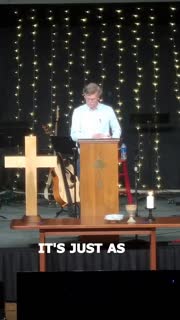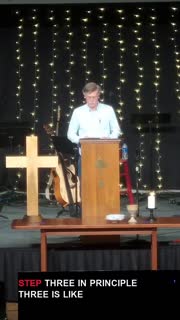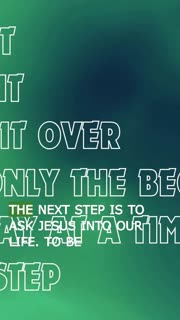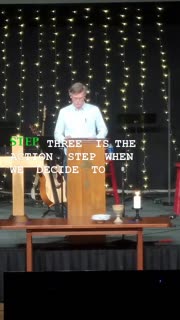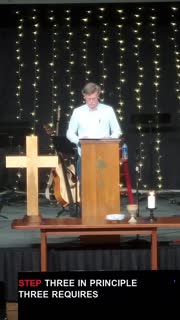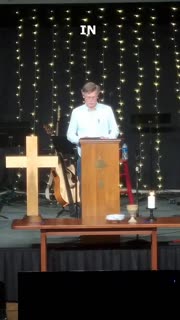Embracing Action: Surrendering to God's Care
Devotional
Sermon Summary
Bible Study Guide
Sermon Clips
### Quotes for Outreach
1. "It's just as insane to think that we can manage our own recovery. This lesson is about putting our lives into the hands of the higher power because Number one God alone knows the extent of our hurts habits and hang-ups. Number two God alone knows what it is needed for healing. Number three God alone has our best interest in our heart." [33:36] (34 seconds)
2. "Step three in principle three is like opening a door. All you need is a willingness to make the decision. Christ will do the rest. He said, here I am. I stand at the door and knock. And if anyone hears my voice and opens the door, I will come in and eat with that person and they with me." [40:40] (25 seconds)
3. "The letter T in action stands for turn it over. Let go and let God. You have heard that phrase many times in recovery. It doesn't say just let go of some things to God. It doesn't just say let go of, turn over only the big things. Proverbs 3, 6 tells us, in everything you do, put God first. And he will direct you and crown your efforts with success." [46:23] (32 seconds)
4. "The letter O in action stands for one day at a time. Our recoveries happen one day at a time. If we remain stuck in yesterday or constantly worry about tomorrow, we will waste the precious time of the present. And it's only in the present that change and growth can occur. We can't change yesterday. And we can only pray for tomorrow." [48:05] (31 seconds)
5. "The next step is to ask Jesus into our life. To be your higher power. How? It's simple. Pastor Rick Warren, one of the founders of Celebrate Recovery, developed an easy way to establish a spiritual base, B-A-S-E, for your life. Ask yourself the following four questions. Seek to answer all four with yes." [49:33] (32 seconds)
### Quotes for Members
1. "Step three is the action step. When we decide to turn the knife over to God we decide to ask Him to take control of our will and our lives. We have journeyed starting with step one faced our state of denial and admitted our powerlessness and inability to manage our lives. Then we went into step two. We have hope and sense of sanity that God can heal us." [34:03] (37 seconds)
2. "But even after taking these steps we can still be stuck in the cycle of failure that keeps us bound by what? Guilt Anger Fear and depression. Throughout the years in facilitating step studies inside the Blount County Justice Center and here for our Welcome Home Open Share group I have made a big effort to make it clear has a major point of emphasis that you must take action." [35:09] (33 seconds)
3. "Step three in principle three requires us to work through a decision-making process that includes, number one, consider how well the present management of our lives, is really going. Number two, consider our needs, God's ability for the future. Number three, take time to contemplate the changes. And finally, number four, make a decision that God is only one able to manage our lives, that his will for us is best." [39:48] (36 seconds)
4. "In step one and two, we establish the basis for turning our lives over to the care of God. The commitment we now make is step three, must be repeated more than once. Actually, we are just beginning to turn things over to God. Repeated working on the first three steps and principles helps to build a solid foundation for working the total program, the full journey." [41:32] (33 seconds)
5. "In principle three, we change our identity. We change our definition of willpower. Willpower becomes a willingness to accept God's power to guide your life. We come to see that there is no room for God if we are full of ourselves. We need to pray the prayer the farmers, psalmist, excuse me, prayed when he said, teach me to do your will for you are my God. May your good spirit lead me on a level ground." [45:28] (34 seconds)
Ask a question about this sermon
1. "It's just as insane to think that we can manage our own recovery. This lesson is about putting our lives into the hands of the higher power because Number one God alone knows the extent of our hurts habits and hang-ups. Number two God alone knows what it is needed for healing. Number three God alone has our best interest in our heart." [33:36] (34 seconds)
2. "Step three in principle three is like opening a door. All you need is a willingness to make the decision. Christ will do the rest. He said, here I am. I stand at the door and knock. And if anyone hears my voice and opens the door, I will come in and eat with that person and they with me." [40:40] (25 seconds)
3. "The letter T in action stands for turn it over. Let go and let God. You have heard that phrase many times in recovery. It doesn't say just let go of some things to God. It doesn't just say let go of, turn over only the big things. Proverbs 3, 6 tells us, in everything you do, put God first. And he will direct you and crown your efforts with success." [46:23] (32 seconds)
4. "The letter O in action stands for one day at a time. Our recoveries happen one day at a time. If we remain stuck in yesterday or constantly worry about tomorrow, we will waste the precious time of the present. And it's only in the present that change and growth can occur. We can't change yesterday. And we can only pray for tomorrow." [48:05] (31 seconds)
5. "The next step is to ask Jesus into our life. To be your higher power. How? It's simple. Pastor Rick Warren, one of the founders of Celebrate Recovery, developed an easy way to establish a spiritual base, B-A-S-E, for your life. Ask yourself the following four questions. Seek to answer all four with yes." [49:33] (32 seconds)
### Quotes for Members
1. "Step three is the action step. When we decide to turn the knife over to God we decide to ask Him to take control of our will and our lives. We have journeyed starting with step one faced our state of denial and admitted our powerlessness and inability to manage our lives. Then we went into step two. We have hope and sense of sanity that God can heal us." [34:03] (37 seconds)
2. "But even after taking these steps we can still be stuck in the cycle of failure that keeps us bound by what? Guilt Anger Fear and depression. Throughout the years in facilitating step studies inside the Blount County Justice Center and here for our Welcome Home Open Share group I have made a big effort to make it clear has a major point of emphasis that you must take action." [35:09] (33 seconds)
3. "Step three in principle three requires us to work through a decision-making process that includes, number one, consider how well the present management of our lives, is really going. Number two, consider our needs, God's ability for the future. Number three, take time to contemplate the changes. And finally, number four, make a decision that God is only one able to manage our lives, that his will for us is best." [39:48] (36 seconds)
4. "In step one and two, we establish the basis for turning our lives over to the care of God. The commitment we now make is step three, must be repeated more than once. Actually, we are just beginning to turn things over to God. Repeated working on the first three steps and principles helps to build a solid foundation for working the total program, the full journey." [41:32] (33 seconds)
5. "In principle three, we change our identity. We change our definition of willpower. Willpower becomes a willingness to accept God's power to guide your life. We come to see that there is no room for God if we are full of ourselves. We need to pray the prayer the farmers, psalmist, excuse me, prayed when he said, teach me to do your will for you are my God. May your good spirit lead me on a level ground." [45:28] (34 seconds)
